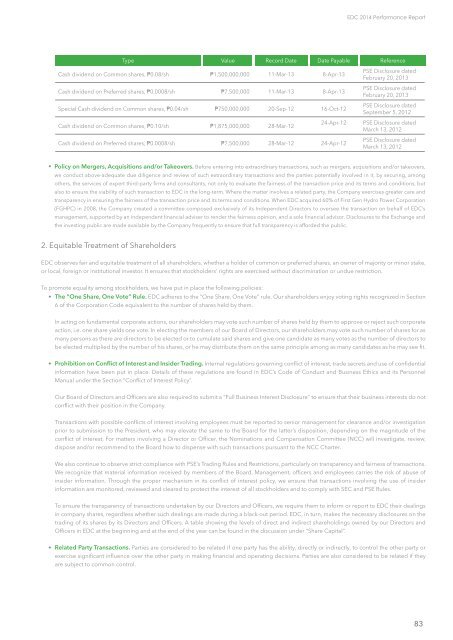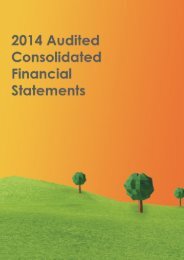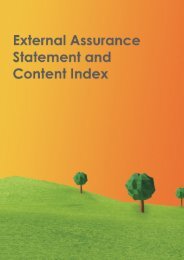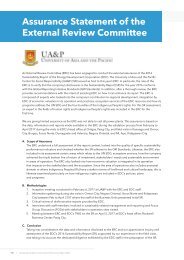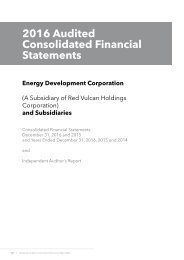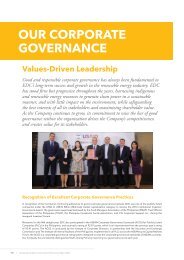EDC 2014 SR (UPDATED)
You also want an ePaper? Increase the reach of your titles
YUMPU automatically turns print PDFs into web optimized ePapers that Google loves.
<strong>EDC</strong> <strong>2014</strong> Performance Report<br />
Type Value Record Date Date Payable Reference<br />
Cash dividend on Common shares, ₱0.08/sh ₱1,500,000,000 11-Mar-13 8-Apr-13<br />
Cash dividend on Preferred shares, ₱0.0008/sh ₱7,500,000 11-Mar-13 8-Apr-13<br />
Special Cash dividend on Common shares, ₱0.04/sh ₱750,000,000 20-Sep-12 16-Oct-12<br />
PSE Disclosure dated<br />
February 20, 2013<br />
PSE Disclosure dated<br />
February 20, 2013<br />
PSE Disclosure dated<br />
September 5, 2012<br />
Cash dividend on Common shares, ₱0.10/sh ₱1,875,000,000 28-Mar-12<br />
24-Apr-12<br />
PSE Disclosure dated<br />
March 13, 2012<br />
Cash dividend on Preferred shares, ₱0.0008/sh ₱7,500,000 28-Mar-12 24-Apr-12<br />
PSE Disclosure dated<br />
March 13, 2012<br />
• Policy on Mergers, Acquisitions and/or Takeovers. Before entering into extraordinary transactions, such as mergers, acquisitions and/or takeovers,<br />
we conduct above-adequate due diligence and review of such extraordinary transactions and the parties potentially involved in it, by securing, among<br />
others, the services of expert third-party firms and consultants, not only to evaluate the fairness of the transaction price and its terms and conditions, but<br />
also to ensure the viability of such transaction to <strong>EDC</strong> in the long-term. Where the matter involves a related party, the Company exercises greater care and<br />
transparency in ensuring the fairness of the transaction price and its terms and conditions. When <strong>EDC</strong> acquired 60% of First Gen Hydro Power Corporation<br />
(FGHPC) in 2008, the Company created a committee composed exclusively of its Independent Directors to oversee the transaction on behalf of <strong>EDC</strong>’s<br />
management, supported by an independent financial adviser to render the fairness opinion, and a sole financial advisor. Disclosures to the Exchange and<br />
the investing public are made available by the Company frequently to ensure that full transparency is afforded the public.<br />
2. Equitable Treatment of Shareholders<br />
<strong>EDC</strong> observes fair and equitable treatment of all shareholders, whether a holder of common or preferred shares, an owner of majority or minor stake,<br />
or local, foreign or institutional investor. It ensures that stockholders’ rights are exercised without discrimination or undue restriction.<br />
To promote equality among stockholders, we have put in place the following policies:<br />
• The “One Share, One Vote” Rule. <strong>EDC</strong> adheres to the “One Share, One Vote” rule. Our shareholders enjoy voting rights recognized in Section<br />
6 of the Corporation Code equivalent to the number of shares held by them.<br />
In acting on fundamental corporate actions, our shareholders may vote such number of shares held by them to approve or reject such corporate<br />
action, i.e. one share yields one vote. In electing the members of our Board of Directors, our shareholders may vote such number of shares for as<br />
many persons as there are directors to be elected or to cumulate said shares and give one candidate as many votes as the number of directors to<br />
be elected multiplied by the number of his shares, or he may distribute them on the same principle among as many candidates as he may see fit.<br />
• Prohibition on Conflict of Interest and Insider Trading. Internal regulations governing conflict of interest, trade secrets and use of confidential<br />
information have been put in place. Details of these regulations are found in <strong>EDC</strong>’s Code of Conduct and Business Ethics and its Personnel<br />
Manual under the Section “Conflict of Interest Policy”.<br />
Our Board of Directors and Officers are also required to submit a “Full Business Interest Disclosure” to ensure that their business interests do not<br />
conflict with their position in the Company.<br />
Transactions with possible conflicts of interest involving employees must be reported to senior management for clearance and/or investigation<br />
prior to submission to the President, who may elevate the same to the Board for the latter’s disposition, depending on the magnitude of the<br />
conflict of interest. For matters involving a Director or Officer, the Nominations and Compensation Committee (NCC) will investigate, review,<br />
dispose and/or recommend to the Board how to dispense with such transactions pursuant to the NCC Charter.<br />
We also continue to observe strict compliance with PSE’s Trading Rules and Restrictions, particularly on transparency and fairness of transactions.<br />
We recognize that material information received by members of the Board, Management, officers and employees carries the risk of abuse of<br />
insider information. Through the proper mechanism in its conflict of interest policy, we ensure that transactions involving the use of insider<br />
information are monitored, reviewed and cleared to protect the interest of all stockholders and to comply with SEC and PSE Rules.<br />
To ensure the transparency of transactions undertaken by our Directors and Officers, we require them to inform or report to <strong>EDC</strong> their dealings<br />
in company shares, regardless whether such dealings are made during a black-out period. <strong>EDC</strong>, in turn, makes the necessary disclosures on the<br />
trading of its shares by its Directors and Officers. A table showing the levels of direct and indirect shareholdings owned by our Directors and<br />
Officers in <strong>EDC</strong> at the beginning and at the end of the year can be found in the discussion under “Share Capital”.<br />
• Related Party Transactions. Parties are considered to be related if one party has the ability, directly or indirectly, to control the other party or<br />
exercise significant influence over the other party in making financial and operating decisions. Parties are also considered to be related if they<br />
are subject to common control.<br />
83


